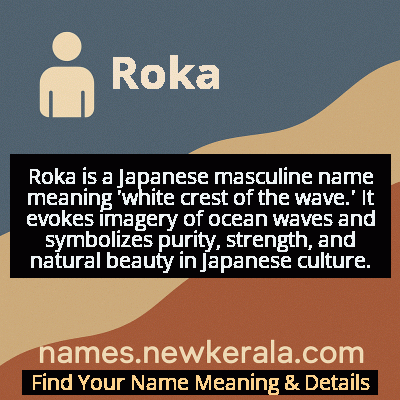Roka Name Meaning & Details
Origin, Popularity, Numerology Analysis & Name Meaning of Roka
Discover the origin, meaning, and cultural significance of the name ROKA. Delve into its historical roots and explore the lasting impact it has had on communities and traditions.
Name
Roka
Gender
Male
Origin
Japanese
Lucky Number
9
Meaning of the Name - Roka
Roka is a Japanese masculine name meaning 'white crest of the wave.' It evokes imagery of ocean waves and symbolizes purity, strength, and natural beauty in Japanese culture.
Roka - Complete Numerology Analysis
Your Numerology Number
Based on Pythagorean Numerology System
Ruling Planet
Mars
Positive Nature
Generous, passionate, energetic, and humanitarian.
Negative Traits
Impulsive, impatient, moody, and can be overly emotional.
Lucky Colours
Red, maroon, scarlet.
Lucky Days
Tuesday.
Lucky Stones
Red coral, garnet.
Harmony Numbers
1, 2, 3, 6.
Best Suited Professions
Military, sports, philanthropy, leadership roles.
What People Like About You
Courage, energy, leadership, generosity.
Famous People Named Roka
Roka Tokutomi
Novelist
Prominent Japanese author known for naturalist literature and social commentary
Roka Miyazaki
Martial Artist
Renowned karate master and founder of contemporary martial arts schools
Roka Watanabe
Environmental Scientist
Leading researcher in marine conservation and oceanography
Name Variations & International Equivalents
Click on blue names to explore their detailed meanings. Gray names with will be available soon.
Cultural & Historical Significance
Historically, names incorporating natural elements like Roka were particularly favored during the Edo and Meiji periods, reflecting Japan's deep connection with its natural surroundings. The wave motif appears extensively in Japanese art, literature, and poetry, from ukiyo-e prints to haiku, where it often represents both the destructive and creative forces of nature. This name connects the bearer to Japan's maritime heritage and the philosophical concept of mono no aware - the awareness of impermanence and gentle sadness at life's transience.
Extended Personality Analysis
Individuals named Roka are often perceived as possessing a dynamic and adaptable personality, much like the ocean waves that inspire their name. They typically exhibit a balance of strength and flexibility, able to navigate life's challenges with resilience while maintaining a sense of fluidity in their approach. Their character often combines the powerful, determined nature of crashing waves with the serene, reflective quality of calm waters, making them both formidable and contemplative.
Roka-named individuals tend to be innovative thinkers who embrace change rather than resist it, viewing obstacles as opportunities for transformation. They often demonstrate leadership qualities tempered with empathy, and their presence can be both calming and invigorating to those around them. The 'white crest' aspect of their name suggests a purity of intention and clarity of purpose, often manifesting as honesty, transparency in relationships, and a strong moral compass that guides their decisions and interactions.
Modern Usage & Popularity
In contemporary Japan, Roka remains a distinctive but not overly common masculine name, appealing to parents seeking a name that blends traditional Japanese aesthetics with modern sensibilities. While it never reached the popularity peaks of more mainstream names, it has maintained a steady presence, particularly among families with coastal connections or those valuing environmental themes. Recent years have seen a slight increase in usage as parents increasingly choose names with natural meanings and unique phonetic qualities. The name's appeal crosses generational lines, being equally suitable for traditional ceremonies and modern professional contexts, and it's often selected by parents who appreciate its poetic imagery and cultural depth without being overtly traditional.
Symbolic & Spiritual Meanings
Symbolically, Roka represents the intersection of power and purity, strength and transience. The white crest of the wave embodies the moment of maximum energy and beauty in nature's cycles, symbolizing peak performance, achievement, and the fleeting nature of perfection. It serves as a metaphor for life's ephemeral triumphs and the constant motion of existence. The wave itself represents adaptability and resilience, while the white crest signifies clarity, enlightenment, and the purification that comes through challenge and transformation. This combination creates a rich symbolic tapestry that speaks to the Japanese aesthetic of wabi-sabi - finding beauty in imperfection and impermanence.

